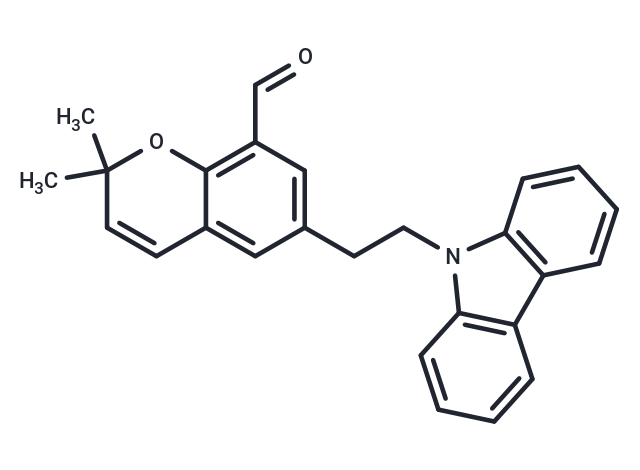Shopping Cart
- Remove All
 Your shopping cart is currently empty
Your shopping cart is currently empty

BJE6-106 (B106) is a potent and selective PKCδ inhibitor with an IC50 of 0.05 μM, demonstrating significant selectivity over classical PKCα (IC50: 50 μM). It induces caspase-dependent apoptosis and has a tumor-specific effect.

| Pack Size | Price | Availability | Quantity |
|---|---|---|---|
| 25 mg | $1,140 | 6-8 weeks | |
| 50 mg | $1,490 | 6-8 weeks | |
| 100 mg | $2,320 | 6-8 weeks | |
| 1 mL x 10 mM (in DMSO) | $365 | 6-8 weeks |
| Description | BJE6-106 (B106) is a potent and selective PKCδ inhibitor with an IC50 of 0.05 μM, demonstrating significant selectivity over classical PKCα (IC50: 50 μM). It induces caspase-dependent apoptosis and has a tumor-specific effect. |
| Targets&IC50 | PKCα:50 μM, PKCδ:0.05 μM |
| In vitro | BJE6-106 (0.2 μM, 0.5 μM; 6-24 hours) triggers caspase-dependent apoptosis, increases the activity of caspase 3/7, the effect of B106 is greater than rottlerin (10-fold) in SBcl2 cells. BJE6-106 (0.2 μM, 0.5 μM; 24-72 hours) suppresses cell survival in melanoma cell lines with NRAS mutations. BJE6-106 (0.5 μM; 2-10 hours) activates the MKK4-JNK-H2AX Pathway by inducing JNK, MKK4, and H2AX activation at different times in SBcl2 cells. |
| Alias | B106 |
| Molecular Weight | 381.47 |
| Formula | C26H23NO2 |
| Cas No. | 1564249-38-2 |
| Relative Density. | 1.16 g/cm3 (Predicted) |
| Storage | Powder: -20°C for 3 years | In solvent: -80°C for 1 year | Shipping with blue ice. |

Copyright © 2015-2025 TargetMol Chemicals Inc. All Rights Reserved.